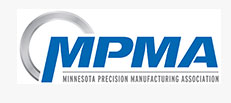Nowadays, metal stamping is a pillar of many industries due to its quality and precision. This is as distinguished from metal stamping’s distant ancestors, also called forging and casting.
So how is a stamped part manufactured? In short, a die is mounted to a press that cycles back and forth. Imagine it as the modern-day equivalent of a hammer and anvil. Usually, the process can be used for both sheet and coil form metal, forming, drawing, blanking, cutting, and piercing metal in precisely the correct quantities.
Engineering the perfect die cast to press sheet metal can have limitless applications in industrial fabrication. The following list addresses five specific industries where metal stamping is beneficial.
1. Fluid Power
Hydraulics and pneumatics are a major component of the fluid power industry, which is characterized by its powerful yet hidden hydraulics and pneumatics. Therefore, complex stampings and complex engineering systems are required to complement your fittings. Material properties such as moisture, pressure, and temperature, in combination with part longevity necessities, make metal stamping a viable design choice. Precision machining, durability in all-element conditions, and aesthetic quality make metal stamping an ideal solution for the fluid power industry.
Mounting flanges, valve seals and washers, brackets for harsh environments, and handles could be some examples of these metal products.
2. Aerospace
A metal stamping company’s engineering process involves tight coordination and precise results from designing through fabrication. The aerospace industry needs intensive quality control and continuous documentation to conform to governing body standards. Metal stamping provides high-quality assurances at a low cost. Therefore, all safeguards can be applied and measured, visible, and controlled on a real-time basis without sacrificing cost effectiveness.
For stamping engineers, the industry requires them to pay attention to documentation of production and control processes and standards, including AS9100, the ISO 9001 aerospace standard that satisfies Department of Defense (DOD), NASA and Federal Aviation Administration (FAA) requirements. To deliver the best-quality traceable parts, it is their responsibility to establish quality control measures.
3. Industrial Original Equipment Manufacturing (OEM)
As a result, the demands of OEM part development and design, as well as supply chain viability, are greater. Metal stamping meets the needs of the industrial OEM arena with a design-to-fabrication process that is streamlined under one roof.
With metal stamping, cost per piece can be significantly reduced and time to market improved through advances in technology and virtual modeling. Additionally, material integrity provides a return on investment by offering longevity without the need for replacement.
The manufacturing industry should provide short run metal experts that can use modular tooling for flexible and efficient solutions, provide customized processes and tool design, utilize both national and international OEM applications, and provide continuous customer support.
4. Oil & Gas
Metal stamping is the clear choice for durability and longevity in this industry due to its durability and resistance to corrosion from a range of environmental conditions. In addition to high temperatures, corrosion, and volatile materials, metal stamping is virtually invulnerable to pressure in this industrial environment. Increased precision, specifically with advances in wire EDM machining, leads to lower product failures than other metal stamping methods. Precision metal stamping leads to tighter seals that perform in the harshest conditions.
Metal stamping is used in the oil and gas industry for brackets, handles, washers, and internal sealing components. All of these are designed to withstand harsh and hazardous environments.
5. Medical
As with the industries mentioned above, precision and durability are critical needs for the medical industry – one that directly impacts people’s health. Metal stamped parts can ensure that your machine works on time and without interruption. Product specifications are also easier met with better process control and engineering.
Metal stamping is a perfect solution for precision and durability in medical equipment to meet the demands of an ever-evolving medical industry. The longer durability of metal stamping will provide a better solution over longer periods of time than thermoplastics, which might be cheaper.





